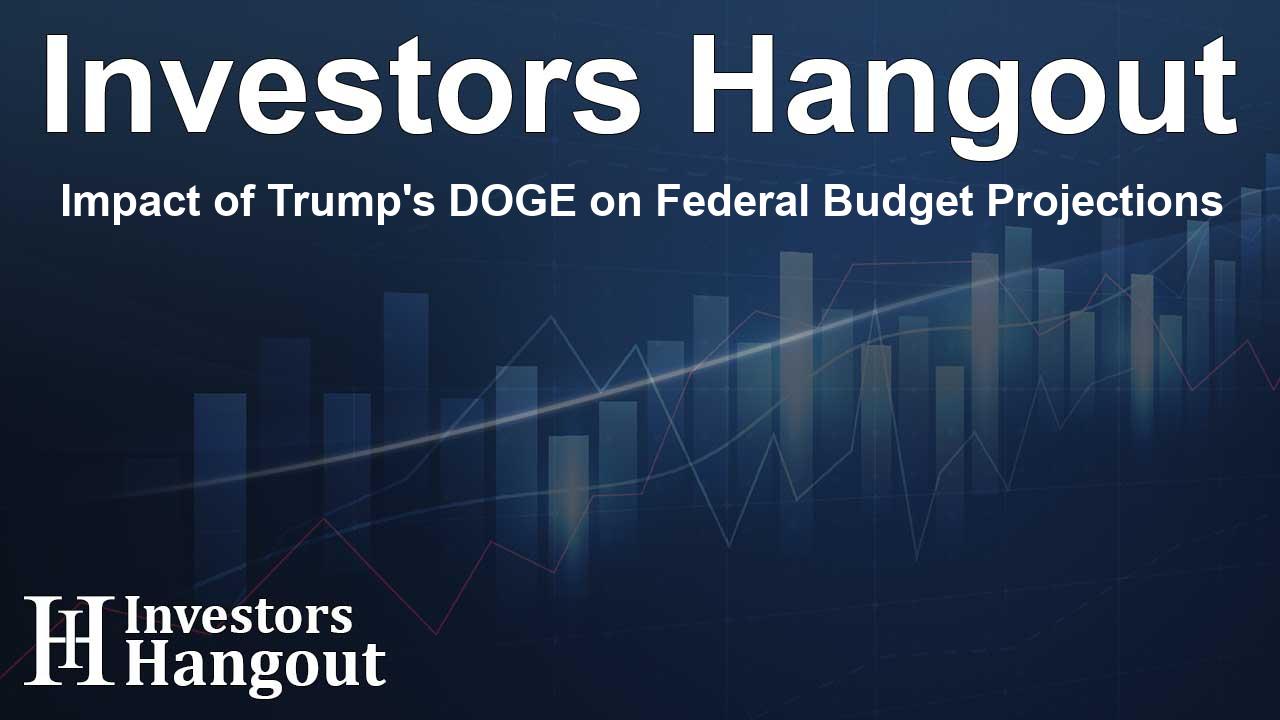Impact of Trump's DOGE on Federal Budget Projections

Understanding Trump's DOGE Initiative
Recently, Donald Trump announced an initiative called the Department of Government Efficiency, commonly referred to as DOGE. The initiative is aimed at reforming federal spending practices in a bid to potentially save billions of dollars annually. According to analyses from the Congressional Budget Office, this program could yield estimated savings of $50 to $100 billion each year.
Expert Insights on Potential Savings
Mario Georgiou, CFA and the executive director of InCred Global Wealth, expressed his views on the potential impact of DOGE. He mentioned that while the initiative is designed to cut wasteful spending and improve fiscal discipline, the expected savings would only be modest relative to the overall federal budget. In 2024, the federal budget deficit could soar up to $1.7 trillion, largely due to mandatory spending on programs like Social Security and Medicare, which collectively constitute over 60% of federal expenditures.
Musk's Role in Shaping DOGE
Elon Musk, the CEO of Tesla Inc. and SpaceX, has taken a co-leadership role in this initiative along with Vivek Ramaswamy. Musk has previously advocated for a significant $2 trillion budget cut and shared that DOGE aims to target unauthorized federal expenditures while ensuring substantial reforms in various sectors.
Goals of the DOGE Initiative
In a recent opinion piece, Musk and Ramaswamy outlined their strategic approach for DOGE. They intend to implement three principal reforms: reducing regulatory burdens, administrative optimizations, and identifying cost savings. By focusing on unauthorized spending, they aim to address overspending that has persisted over years and could account for more than $500 billion in applicable expenditures.
Identifying Areas for Improvement
The scope of discretionary spending claims a smaller fraction of the total budget, which poses challenges when it comes to achieving impactful cuts. Georgiou pointed out that a significant portion of federal contracts has not been reviewed for years, which reveals a gap in accountability and oversight. Musk and Ramaswamy suggest instituting a temporary halt on certain payments to facilitate comprehensive audits, thus identifying areas for greater fiscal responsibility.
Addressing Inefficiencies in Government Spending
One of the most pertinent illustrations of inefficiency cited was the Pentagon's failure to pass multiple audits, raising questions regarding its ability to manage its budget, which exceeds $800 billion annually. A significant goal of DOGE is to focus on delivering savings for taxpayers by identifying and targeting waste and fraud that many believe should be curtailed.
Challenges in Tackling Entitlement Programs
Musk and Ramaswamy have been under scrutiny for their proposed budget cuts that include entitlement programs. They defend their position by emphasizing the need to tackle the overarching issues related to waste and inefficiencies without solely relying on reducing benefits that affect the public. Critics claim that addressing entitlement programs is the only way to impact the federal deficit meaningfully.
The Future of the DOGE Initiative
As the DOGE initiative continues to evolve, its potential implications on federal financial management will be closely monitored. With ambitious goals set by Musk and Ramaswamy, the outcome of this initiative could redefine spending policies and determine the effectiveness of proposed government reforms.
Frequently Asked Questions
What is the DOGE initiative?
The DOGE initiative, led by Donald Trump, aims to enhance government efficiency and reduce federal spending by cutting wasteful expenditures.
How much money does DOGE aim to save?
According to estimates, the DOGE initiative could save between $50 to $100 billion annually, though its impact may be modest compared to overall federal spending.
Who is involved in the DOGE initiative?
Elon Musk and Vivek Ramaswamy play key roles in the DOGE initiative, contributing to its strategy and operational decisions.
What are the main objectives of DOGE?
The main objectives include reducing regulatory burdens, optimizing administrative processes, and identifying cost-saving opportunities within unauthorized federal expenditures.
Why are entitlement programs a focus of DOGE?
Musk and Ramaswamy believe addressing entitlement programs is crucial for tackling government inefficiencies, though they emphasize that eliminating waste and fraud in all spending is equally important.
About Investors Hangout
Investors Hangout is a leading online stock forum for financial discussion and learning, offering a wide range of free tools and resources. It draws in traders of all levels, who exchange market knowledge, investigate trading tactics, and keep an eye on industry developments in real time. Featuring financial articles, stock message boards, quotes, charts, company profiles, and live news updates. Through cooperative learning and a wealth of informational resources, it helps users from novices creating their first portfolios to experts honing their techniques. Join Investors Hangout today: https://investorshangout.com/
Disclaimer: The content of this article is solely for general informational purposes only; it does not represent legal, financial, or investment advice. Investors Hangout does not offer financial advice; the author is not a licensed financial advisor. Consult a qualified advisor before making any financial or investment decisions based on this article. The author's interpretation of publicly available data shapes the opinions presented here; as a result, they should not be taken as advice to purchase, sell, or hold any securities mentioned or any other investments. The author does not guarantee the accuracy, completeness, or timeliness of any material, providing it "as is." Information and market conditions may change; past performance is not indicative of future outcomes. If any of the material offered here is inaccurate, please contact us for corrections.